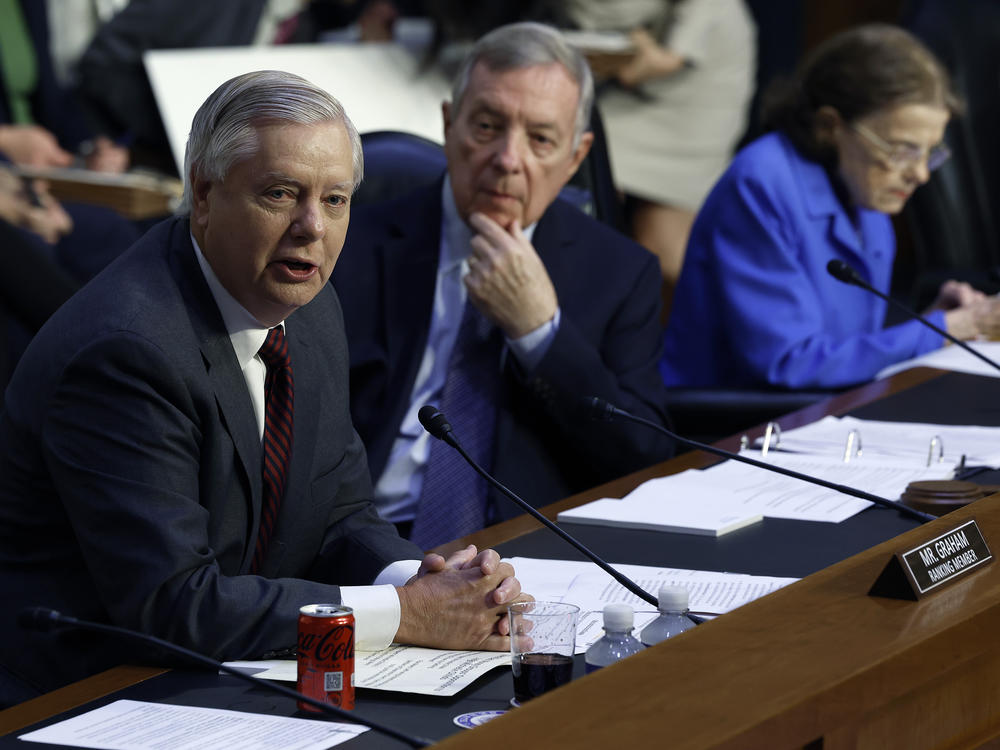Section Branding
Header Content
After McConnell's and Feinstein's episodes, should age limits be on the table?
Primary Content
Can someone be too old to hold office?
That age-old question was front and center last week after awkward episodes from two of the oldest members of the U.S. Senate.
On Wednesday, Sen. Mitch McConnell, 81, abruptly froze for over 30 seconds during his weekly news conference. A day later, Sen. Dianne Feinstein, 90, had to be reminded by a colleague to "Just say, 'Aye' " while casting her vote for the military budget.
Both incidents were brief, but chances are they won't be the last. The median age of U.S. senators is 65 — a record high — while the median age of representatives in the House is 58. In the White House, President Biden, 80, is the oldest president elected in U.S. history, and he hopes to remain in office until 86.
People age at different rates, but concerns over life expectancy and mental fitness will likely keep resurfacing as Congress gets older and there are few legal options to address gerontocracy.
Why do we have an age minimum but not an age maximum to hold office?
Maximum age limits are considered unconstitutional. Part of the reason that's true dates back to 1995. At the time, Arkansas attempted to deny ballot access to prospective U.S. representatives who had already served three terms and prospective U.S. senators who had already served two terms.
That case was argued in front of the Supreme Court in U.S. Term Limits, Inc. v. Thornton. The court ruled that the Framers could have created term limits for lawmakers in Congress but chose not to, suggesting that they did not intend for term limits to be part of the Constitution.
The same could be argued against maximum age limits, according to Jeremy Paul, who teaches at Northeastern University School of Law.
"Whether you're talking about adding term limits or whether you're talking about a maximum age, you're still changing the qualifications that are set out in the Constitution," Paul said.
Could there be age limits in the future for politicians in Washington?
The military, commercial pilots and, in some states, judges all follow a mandatory age for retirement. But imposing an age limit for the president or lawmakers serving in Congress would be a much harder lift.
Essentially, it would require Congress to add a new amendment to the Constitution. Doing so generally requires the support of two-thirds of both chambers of Congress, as well as three-quarters of the state legislatures. The last time Congress added an amendment was over 30 years ago.
Even if there was widespread support for setting a retirement age, Paul said it would be a complicated feat to settle on what age that should be.
"Whatever age you pick, there will be arbitrariness to it," he said.
Why do we keep electing older adults?
In elections, age does not tend to play a big, decisive role, according to Damon Roberts, a Ph.D. candidate at the University of Colorado Boulder who has researched whether voters prefer older or younger candidates.
In an online survey with 1,000 respondents, Roberts found that both young and older people were equally supportive of a 23-year-old candidate, a 50-year-old candidate and a 77-year-old candidate — even if they believed stereotypes that old age is associated with forgetfulness and closed-mindedness.
Instead, a candidate's political party, race, gender and where they stood on specific issues held more sway.
"We have other things that are really salient in American politics that people use quite strongly to base their voting decisions off," Roberts said.
The case for and against term limits
For some, being a senator or representative in Congress is a full-time career. That can be a good or bad thing, according to Northeastern University's Paul.
Some argue that term limits are the best way to address gerontocracy. With more turnover comes new ideas and a chance to challenge the status quo in Washington.
But critics say multiple terms help elected officials gain institutional knowledge and build relationships needed to become more effective in passing legislation. Paul said that seniority also plays a major role on Capitol Hill and that longtime lawmakers in Congress tend to be more influential in their party, as well as lead important committees.
"There's really no substitute for experience," Paul said.
Copyright 2023 NPR. To see more, visit https://www.npr.org.

